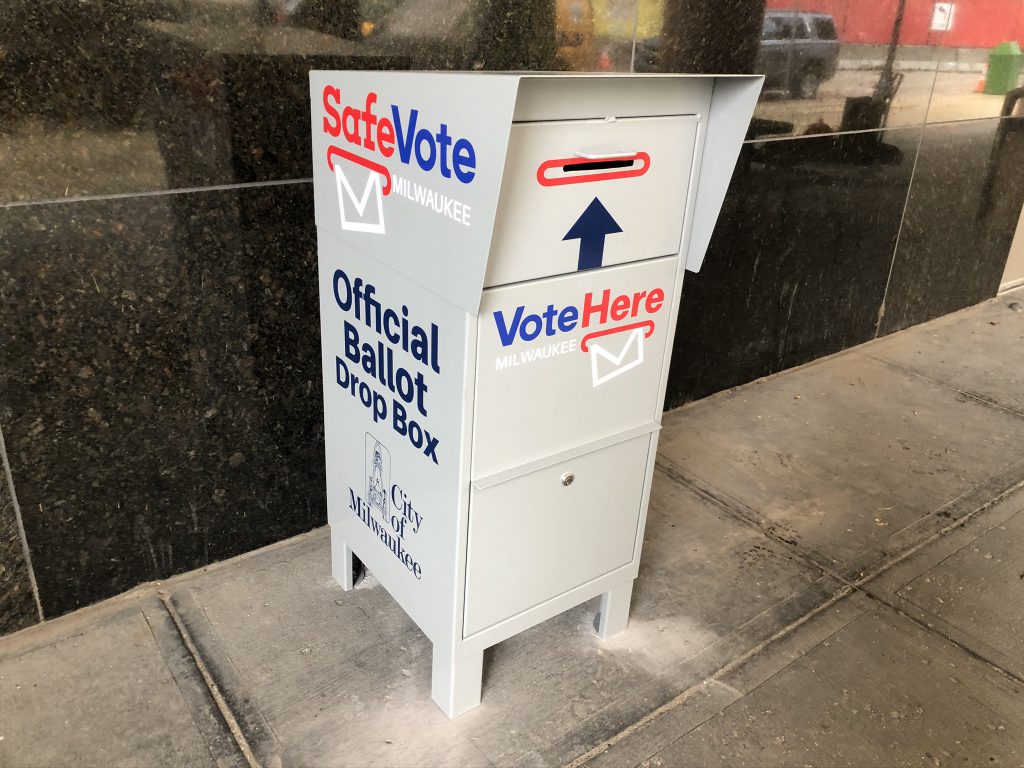Will Wisconsin Supreme Court Legalize Absentee Ballot Boxes?
It rejected three issues raised in lawsuit and will rule on only one. Why?
During the height of the COVID-19 pandemic, the use of drop boxes became a very popular way to submit absentee ballots. Wisconsin voters viewed drop boxes as having several virtues. These included avoiding the danger of contracting Covid from polling place crowds and avoiding the long lines seen in Wisconsin’s April 2020 elections. Ballots deposited in the drop boxes would be counted so long as they were deposited before the close of voting.
Later, however, in a case called Richard Teigen v. Wisconsin Elections Commission, Hagedorn changed his mind on the issue, and a 4-3 majority of the court ruled that drop boxes were illegal.
Now, with a new, 4-3 liberal court majority, drop boxes may be poised to return in Wisconsin. An organization called Priorities USA has brought a lawsuit aimed at making voting easier in Wisconsin. This was brought in a Petition for “Original action,” meaning that the Supreme Court take it directly, rather than as an appeal from a decision by a circuit court or court of appeal.
Represented by the well-known Elias Law Group, Priorities USA’ complaint lists four issues, each of which make it more difficult to cast an absentee ballot:
- The requirement that absentee ballots be accompanied by the signature and address of a witness.
- The previous Court’s prohibition against drop boxes.
- The requirement that mistakes on absentee ballots be corrected by the end of election day.
- Language in article 6.84 of the Wisconsin statutes that disparages absentee voting. It starts by describing voting as “a constitutional right, the vigorous exercise of which should be strongly encouraged. In contrast, voting by absentee ballot is a privilege exercised wholly outside the traditional safeguards of the polling place.” The brief complains that this provision “seeks to establish absentee votes as being less valuable and worthy of protection than in-person ballots.”
On March 12 of this year, in an unsigned opinion, the court granted the petition to bypass lower courts, but only for the second of the four issues, the drop box prohibition. It made it clear that it did not want to hear about any of the other three issues—”plaintiffs-appellants may not raise or argue issues not set forth in this order.” It set May 13 for oral arguments on Priorities USA v. Wisconsin Elections Commission.
The court majority does not spell out why it decided to accept the drop box issue and only that issue. Unsurprisingly, in their dissent, Justices Rebecca Grassl Bradley and Annette Ziegler bring up that question.
Three of these laws were challenged by the governor. First was the ability of the Legislature’s Joint Committee on Finance to veto or hold without action conservation projects selected by the Wisconsin Department of Natural Resources (DNR) under the Knowles-Nelson Stewardship Program. The second gave the Legislature’s Joint Committee on Employment Relations the ability to block Universities of Wisconsin system employees pay raises until the university agreed to cut spending on diversity, equity and inclusion (DEI) programs. The third gave the Legislature’s Joint Committee for Review of Administrative Rules the ability to veto efforts to update the state’s commercial building standards and ethics standards for social workers, marriage and family therapists, and professional counselors.
The Court accepted only the first of these issues—the ability of its committee to reject or hold conservation projects. A recent Milwaukee area example was the committee’s veto of a grant to the Ozaukee Washington Land Trust to buy the very scenic Clay Bluffs-Cedar Gorge site overlooking Lake Michigan just south of Port Washington. The author of the veto was never disclosed. Apparently, it was done as a favor to someone who hoped to build luxury housing on the very scenic site.
The two issues chosen by the Supreme Court—whether to revive absentee ballot boxes and the Legislature’s sabotaging of Knowles-Nelson conservation grants–are ripe for reconsideration. The secrecy about who ordered the hold on Clay Bluffs, in particular, is strongly suggestive of corruption. And even though Covid has loosened its grip, drop boxes offer a useful alternative, especially for people with mobility issues.
But why did the court choose only those particular issues? It doesn’t say.
It also does not say what it will do with the five issues it currently has set aside. However, it uses the same language in both cases: that these issues “are held in abeyance pending further order of the court.”
If you think stories like this are important, become a member of Urban Milwaukee and help support real, independent journalism. Plus you get some cool added benefits.
Data Wonk
-
Why Absentee Ballot Drop Boxes Are Now Legal
 Jul 17th, 2024 by Bruce Thompson
Jul 17th, 2024 by Bruce Thompson
-
The Imperial Legislature Is Shot Down
 Jul 10th, 2024 by Bruce Thompson
Jul 10th, 2024 by Bruce Thompson
-
Counting the Lies By Trump
 Jul 3rd, 2024 by Bruce Thompson
Jul 3rd, 2024 by Bruce Thompson




















Why don’t people that get absentee ballots just return them by mail from their homes or apartments? Surely the easiest way to submit a ballot. And, since USPS is required to pick up mail at peoples homes and apartments, it’s a system for ballot submission that’s already in place and available to everyone. I have nothing against them, but I don’t understand what the drop boxes are for.
Likewise, maybe OT, but why hasn’t Wisconsin switched yet to universal vote-by-mail? Oregon’s had it successfully for over 20 years. Colorado, Washington, California, Hawaii, Nevada, Vermont, and D.C. all have it now. I don’t have stats but I believe it’s been shown to increase voter participation because it just makes it easier for everyone to vote (and eliminates all of the problems that go with polling places on election days).
I don’t know how mail is picked up from apartment buildings, but at my home, I secure outgoing mail to my mailbox with a clothespin, to await the mail carrier’s arrival. I don’t mind leaving a greeting card secured that way. If it gets lost, it’s no big deal. But I would never leave a tax return or an absentee ballot or similar important papers in plain sight of others, especially since the mail carriers don’t always arrive at predictable times of the day. Even in a “safe” neighborhood, theft is possible.
Mr. Bernard, please consider that many voters request absentee ballots because they are not going to be home at election time.